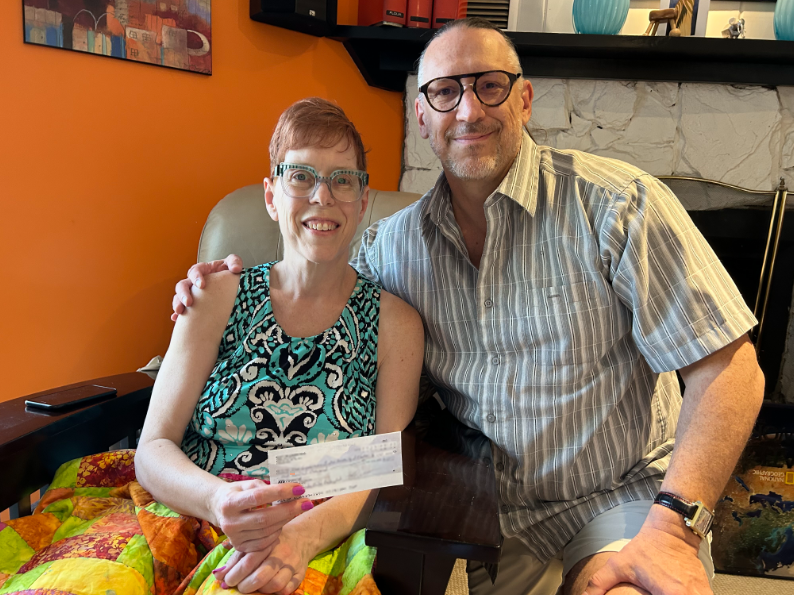Advancing the future of ocular cancer detection
Madisen Gee - 28 September 2023

Leanne and Scott Reeb. Photo supplied.
Leanne Reeb, ’05 MBA, never let anything slow her down — not even cancer.
Three weeks before she passed away, her husband, Scott, got up in the middle of the night and noticed Leanne wasn’t in bed. Scott found her in their home office, leaning against the wall for support, working away. “I just really want to work on this last report and get it done,” she told him.
It will not come as a surprise to anyone who knew Leanne that she did in fact finish the report.
In 2017, Leanne started seeing flashes in her vision. She was eventually diagnosed with uveal melanoma, more commonly known as ocular cancer. After undergoing an advanced form of radiation called brachytherapy, which removed the cancer from her eye, she remained in remission for five years. However, relapses are quite common in ocular cancer and unfortunately, this turned out to be the case for Leanne. In early 2022, the cancer came back, this time in her liver. Leanne passed away in May 2023.
“She put a great deal of effort into not dwelling on the cancer,” says Scott. “She journaled every day and was a fountain of positivity. She had this saying, that even when she was having a bad day, if people would ask her how she was doing, she would always say ‘super fantastic, awesome’ and she meant it.”
True to her go-getter spirit, Leanne had another project she wanted to see through: a donation to the Western Canada Ocular Oncology Research Fund (WCOORF), specifically support for early detection.
When diagnosed in late stages, survival rates for ocular cancer patients are lower than 30 per cent but skyrocket to almost 97 per cent when detected before the cancer metastasizes, says Ezekiel Weis, professor in the Faculty of Medicine & Dentistry and head of the WCOORF. Weis was Leanne’s doctor throughout her treatment.
The problem with ocular cancer is that it’s extremely difficult to detect in early stages, even for experienced professionals, says Weis. It was only after her cancer diagnoses that doctors went back and reexamined scans of Leanne’s eyes from previous optometrist appointments. The early signs of cancer were there, but nobody caught it.
This was what attracted the Reebs to research being done by Weis and his team, who are developing artificial intelligence to train models that use images of the back of the eye to detect lesions and other early signs of cancer. The hope is that this technology will become available in optometrists' offices and through other primary care providers, making it widely accessible. This would lead to earlier diagnosis and a higher survival rate.
The technology being developed by Weis and his team has the potential to touch many areas beyond ocular cancer.
“When you train these models, it’s like training the technology to learn how to detect something. And then you can actually apply that to many other scenarios, and many potential other cancers,” says Weis. “The first one that would make the most sense is skin cancer. But I think it goes well beyond that as well." As databases become more robust, they will also be applied to different forms of imaging, like ultrasounds or MRIs.
Seeing this work advance is a fitting tribute to Leanne Reeb’s spirit, says Scott.
Whether it be personally or professionally, Leanne was a trailblazer. She was the first graduate of U of A’s masters in public management program in 2005 and went on to have a successful career with Alberta Health Services (AHS). In her most recent role as the executive director of the Digestive Health Strategic Clinical Network at AHS, she was known for being the ultimate team player, bringing out the best in everyone she worked with. Her former AHS team has since created the Leanne Reeb Commemorative Award for Excellence in Collaboration, which recognizes contributions and achievements and will help to ensure her legacy continues to be celebrated. The first recipient will be awarded in May 2024.
“She had a very special and warm personality,” says Louise Morrin, senior provincial director and Leanne’s former supervisor. “She wasn’t just a colleague, but a friend to all of us.”
Leanne’s passion for making a difference will live on through the work she and Scott are funding through the WCOORF. Scott’s hope is that this technology will help save lives, giving other families more time together.